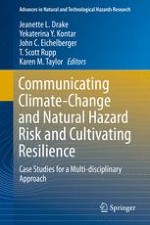2016 | OriginalPaper | Chapter
12. Controlling Environmental Crisis Messages in Uncontrollable Media Environments: The 2011 Case of Blue-Green Algae on Grand Lake O’ the Cherokees, OK
Authors : Alicia M. Mason, Ph.D., James R. Triplett, Ph.D.
Published in: Communicating Climate-Change and Natural Hazard Risk and Cultivating Resilience
Publisher: Springer International Publishing
Activate our intelligent search to find suitable subject content or patents.
Select sections of text to find matching patents with Artificial Intelligence. powered by
Select sections of text to find additional relevant content using AI-assisted search. powered by
